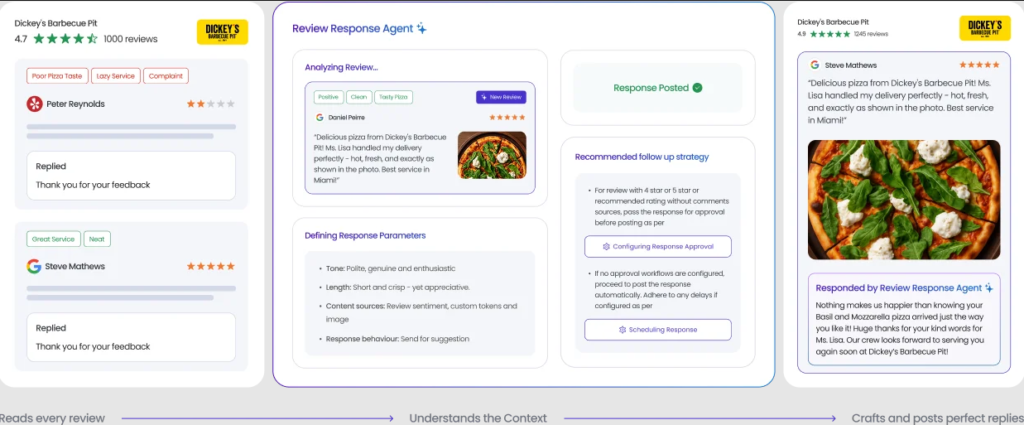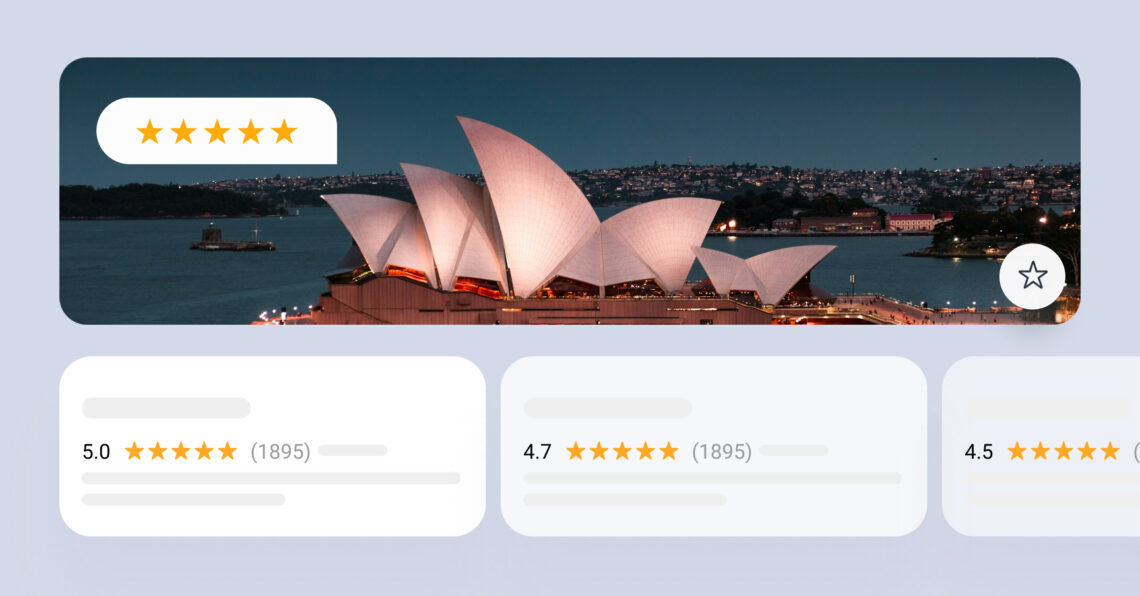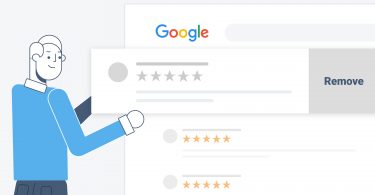Google reviews in Australia gives businesses the edge they need to stand out in a crowded market. But the task is not as easy as it sounds. Most businesses just mention it in passing or have a manual process for sending review requests. So businesses rarely receive responses to their review requests or notice improvements on their Google Business Profile.
Getting more positive reviews can help your business outrank competitors, gain trust in the market, and improve conversion rate. And to consistently get more reviews, businesses need a system that automates review collection, response, sentiment analysis, and more.
This blog post explores strategies for Australian businesses to generate more reviews across locations, build social proof with positive reviews, and outshine competitors in a demanding market organically, without resorting to buying Google reviews in Australia. .
Table of contents
- Why are Google Reviews important for local Australian businesses?
- What are the laws and policies regarding Google reviews in Australia?
- How to manage positive and negative Google reviews in Australia?
- Building an authentic online reputation
- Frequently asked questions on Google reviews Australia
- Grow your Google reviews in Australia with Birdeye
Why are Google Reviews important for local Australian businesses?
While buying Google reviews might seem like a shortcut, there’s no substitute for building an authentic reputation. Here’s why focusing on genuine reviews will always benefit your business in the long run:
- Trust and loyalty: Authentic reviews help you build lasting relationships with customers based on trust.
- SEO benefits: Google rewards businesses that follow its guidelines, improving your rankings organically. Customer reviews written on Google for companies with more recent reviews can expect better search engine visibility.
- Legal safety: Staying within the boundaries of Google’s policies protects you from legal trouble and penalties.
- Valuable customer insights: Genuine reviews offer unfiltered feedback about what customers love—and where you can improve. This insight can guide product development, service improvements, and staff training.
What are the laws and policies regarding Google reviews in Australia?
While most businesses focus on generating more reviews, understanding Australian laws and regulations, and Google review policy is crucial for keeping reviews active on your Google business profile, which in turn boosts your online reputation in Australian markets.
Here is a look at some of the critical laws and policies to keep in mind while managing Google reviews in Australia:
Australian Consumer Law (ACL)
The Australian Consumer Law (ACL) makes it unlawful to buy Google reviews in Australia, post fake testimonials, or selectively publish only positive reviews. The ACCC actively fines businesses that mislead customers by using fabricated or incentivised feedback. Even one branch of a multi-location brand can put the entire organisation at risk if these practices occur.
AHPRA Advertising Guidelines
For healthcare businesses, the AHPRA Advertising Guidelines apply in addition to ACL rules. Providers such as dentists, GPs, and specialists cannot promote testimonials that claim or imply clinical outcomes. Encouraging patients to write reviews that discuss treatment effectiveness could breach the National Law, putting practices in serious legal jeopardy.
Can Australian healthcare providers use Google reviews in marketing?
Healthcare providers must follow AHPRA guidelines, which restrict the use of testimonials that imply treatment outcomes. While reviews may appear on Google, providers cannot selectively promote them in advertising.
Data privacy laws in Australia
When managing reviews, businesses must comply with Australian privacy law. Customer identities and personal health or financial information cannot be disclosed in responses. Failing to protect this data when replying to reviews, especially in sensitive industries such as finance and healthcare, can result in penalties and reputational harm.
Data privacy laws in Australia
When managing reviews, businesses must comply with Australian privacy law. Customer identities and personal health or financial information cannot be disclosed in responses. Failing to protect this data when replying to reviews, especially in sensitive industries such as finance and healthcare, can result in penalties and reputational harm.
Google review policy
The Google review policy in Australia aligns with these legal requirements. It prohibits spammy reviews, conflicts of interest (such as employees reviewing their own business), and incentivised feedback. While Google will act on fake or offensive content, it generally does not support removing genuine reviews simply because they are negative.
Businesses must also maintain an accurate Google Business Profile, since inconsistent NAP (Name, Address, Phone) data can affect both rankings and trust.
Compliance checklist for Google reviews in Australia
1. Do not buy Google reviews in Australia – it’s illegal under ACL and violates Google policy.
2. Request reviews neutrally – ask all customers for feedback without bias toward positive ratings.
3. Avoid spammy reviews – employees, contractors, or bots posting reviews will be removed.
4. No removing genuine reviews – Google will only take down reviews that breach policy, not those that are simply negative.
5. Keep your Google Business Profile accurate – ensure consistent NAP (Name, Address, Phone) across all locations.
6. Follow industry-specific rules – e.g., healthcare providers must comply with AHPRA advertising guidelines.
How to generate genuine Google reviews in Australia?
Building a strong base of authentic reviews is key to improving your Google Business Profile visibility, online reputation, and customer trust. Here’s how Australian businesses can do it right:
- Ask for reviews at the right time: Timing matters. Request reviews immediately after a positive customer interaction, when satisfaction is at its peak.
- Make it easy for customers to leave reviews: Share direct review links via SMS or email so customers don’t have to search for your profile. A frictionless process increases response rates.
- Engage with reviews: Reply to every review – positive or negative. Engagement shows customers you value feedback and signals credibility to Google.
- Use a review generation tool: Manually asking customers for reviews across multiple locations is inconsistent and time-consuming. A review generation tool ensures that requests go out automatically, at scale, and in compliance with Australian regulations. This helps businesses maintain a steady flow of authentic reviews without burdening staff.

How can Australian businesses get more Google Reviews? Pro tip to boost review volume by 120+%
Australian businesses can get more Google reviews by personalizing the review requests so that customers feel special and motivated to leave an authentic and detailed review.
And, if you are struggling to balance scale and personalisation - Birdeye’s Review Generation Agent is the solution you need. The AI agent streamlines the review generation process by sending personalised review requests via SMS, email, and QR codes at the right time.
It integrates with CRMs and POS systems, ensuring every customer gets a fair chance to leave feedback while staying compliant with ACCC and Google review policies.
How many Google reviews does a business need to be competitive in Australia?
Short answer: There is no magic number; it depends on the industry benchmarks, the local market, and the review generation velocity of your competitors. Here is how it works:
- Local competition benchmark: In metro areas like Sydney or Melbourne, many competitive businesses average 100+ reviews per location, while in regional towns, even 30–50 quality reviews can make a business stand out. How many you need would greatly depend on how well your industry and competitors are performing.
- Velocity matters more than volume: Google’s algorithm rewards businesses that consistently earn reviews every month. A steady stream of 10–20 new reviews monthly often signals reliability more strongly than having 500 old reviews.
- Target rating: The number of Google reviews you need per month also depends on your current status and desired outcome. Also, if your industry has less footfall as a whole, you may have to tweak your targets accordingly.
Curious to know what the number is for you? – Try our Google review calculator.
How to manage positive and negative Google reviews in Australia?
Australian businesses must ensure that they respond to positive reviews with gratitude, while approaching negative reviews with an open mind and professional attitude. Take a step ahead in managing reviews at scale with personalized responses, understanding what drives negative reviews with sentiment analysis, and marketing positive reviews across channels to boost social proof.
Here is what you need to know about managing Google reviews effectively in Australia: :
- Respond to positive reviews with gratitude: A simple thank-you builds loyalty and encourages repeat business. Multi-location brands can use Birdeye’s response templates to acknowledge customers quickly while keeping the tone consistent across locations.
- Respond to negative reviews professionally: Avoid defensiveness and focus on resolving the issue. Birdeye flags negative feedback in real time, allowing managers to escalate serious complaints and reply before reputational damage spreads.
- Spot recurring issues with sentiment analysis: Every review has something to offer – positive reviews highlight hardworking employees and top-performing products, while negative reviews often highlight operational problems. Birdeye’s Insights AI uses sentiment analysis to identify recurring themes, helping businesses address root causes instead of reacting case by case.
- Personalize your responses at scale: Customers can tell when replies are robotic, leading to an erosion of trust. Birdeye’s AI agents allow brands to personalise tone, name, and context in every response—while ensuring responses still align with brand guidelines.
- Market positive reviews to build social proof: Reviews shouldn’t just live on Google, but reach every potential client. With Birdeye, businesses can automatically share glowing feedback across websites, social media, and marketing campaigns to strengthen brand reputation.
Responding to every review manually is overwhelming, especially for multi-location businesses. Birdeye’s Review Response Agent automates timely, personalised, and compliant replies across Google and other platforms. It learns your brand’s voice, ensures responses meet regulatory standards, and saves hours of manual work—turning reviews into a powerful asset for growth.
Guide to Google Reviews in Australia
Want to see the impact of Birdeye on your business? Watch the Free Demo Now.
Building an authentic online reputation
Google reviews are an invaluable tool for Australian businesses. They offer an opportunity to enhance your online presence, improve SEO, and build customer trust. By following ethical practices, complying with Australian Consumer Law and Google’s policies, and gathering authentic feedback, you can create a genuine and lasting reputation that benefits your business in the long run.
Avoid the temptation of buying fake reviews and instead focus on providing excellent service, encouraging feedback, and responding thoughtfully to reviews. Doing so will build a strong foundation of trust and credibility that will help your business thrive.
Frequently asked questions on Google reviews Australia
No. Under Australian Consumer Law, offering incentives for Google reviews is considered misleading conduct. Both the ACCC and Google’s review policy prohibit incentivised feedback.
SMS typically delivers higher response rates because it’s immediate and direct. However, combining email and SMS ensures a broader reach and better engagement across customer demographics.
Yes, but only if they breach Google’s review policy. You can flag spam, fake, or defamatory content, but you cannot remove genuine negative reviews.
Birdeye helps businesses collect, monitor, and respond to reviews across every location. With automation, compliance safeguards, and AI-driven insights, Birdeye ensures Australian brands stay competitive and legally compliant.
Buying Google reviews in Australia breaches both ACCC regulations and Google’s policies. Businesses risk penalties, reputational damage, and possible suspension of their Google Business Profile.
Yes, Google reviews have a profound impact on Australian businesses in establishing customer trust, credibility, and improving local search ranking. Google holds 93% of all search traffic in Australia and lack of Google reviews may lead to businesses losing customers to competitors.
Grow your Google reviews in Australia with Birdeye
Birdeye is the #1 purpose-built AI platform designed to help Australian businesses collect, manage, and market Google reviews at scale. With a suite of specialised AI agents, Birdeye ensures your brand stays visible, compliant, and competitive across every location.
From seamless onboarding to ongoing customer support, Birdeye makes review management easy for teams of all sizes. Multi-location businesses benefit from a unified dashboard that centralises review requests, responses, sentiment analysis, and reporting, all in one place.
Whether you’re aiming to increase authentic reviews, respond faster, or gain insights from customer feedback, Birdeye provides the tools and automation you need to grow your reputation and outperform competitors in the Australian market.

Originally published









